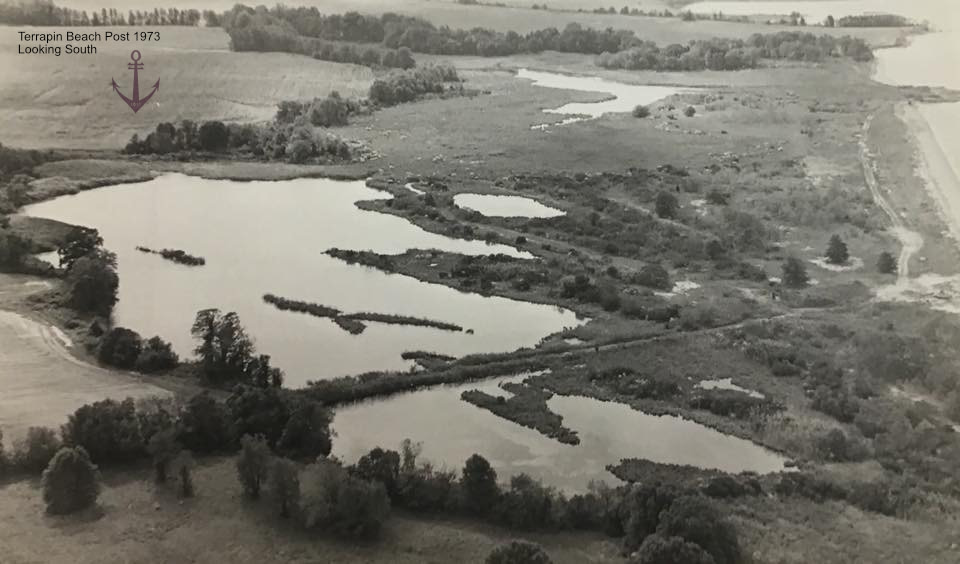Kent Island’s Terrapin Nature Park intertwines a saga of poo plants, politics, and the audacious vision of a championship golf course community.
Rewinding to the early 1970s, Kent Island and the Kent Narrows area faced severe infrastructure challenges, lacking proper sewer and water systems and the funding to build them. With the imminent opening of the second Bay Bridge on June 28, 1973, real estate sales skyrocketed, as developers aimed to transform the island into the next luxury suburbia. County Commissioner President Jack Ashley warned that without a community water system, “thousands of holes would be punched in the ground,” lowering the water table while inviting salt intrusion.
It was in this turbulent clash between Kent Island and western shore developers that the destiny of Terrapin Nature Park dramatically shifted. Today, thanks to a few good County Commissioners, we revel in its natural splendor, blissfully unaware of the alternative fate it narrowly escaped.
On December 29, 1972, W. Evans “Buck” Buchanan purchased a 494 acre waterfront farm immediately north of the Bay Bridge. As president of Montgomery County development firm, W. Evans Buchanan Co., Buck envisioned a $40 million development encompassing 1,700 high-rise condos, 250 houses, and a championship golf course called “Gateway.” The project, later renamed “Terrapin Beach,” would increase Kent Island’s population from 3,000 to 7,400.
Buck was already engrossed in his $3.5 million Kent Cove development in Thompson Creek, where he familiarized himself with Kent Island’s development politics. He needed special zoning exceptions for the Terrapin Beach golf course and condo height. Aware of the County’s water and sewer woes, he offered the County a 12 acre portion of elevated land and financial aid to construct a sewer treatment plant. He emphasized that the location for his private sewer treatment plant closely aligned with a regional sewer site already registered in the QAC Comprehensive Plan. Buck intended to use the system for his own development while also repurposing the discharge to irrigate the expansive 180 acre, 18-hole golf course. Commissioner Leonard Smith, who firmly opposed high-rises on Kent Island, was not sold on Buck’s offer claiming the County needed 20 acres for the proposed regional sewer site.
By August 1973, Buck’s offer had evolved to accommodate the County’s long-range needs. The plant would be the first unit in the County system, treating sewage in lagoons near the shore before discharging into the Chesapeake Bay. Buck claimed the plant could serve 8,000+ people, surpassing his immediate needs and enabling the County to start their program in Stevensville and expand eastward.
The redesigned plan had major flaws. The Commissioners initially believed the treatment plant could cater to all of Grasonville, far greater than 8,000 people. They also raised concerns about the odor from the holding ponds and the zoning setback laws.. Commissioner Smith stated, “I don’t feel the county should rush into anything just because somebody is going to invest a dollar.” Commissioner Grollman added, “We want to do what’s best for our county, not for any one developer.” They tabled the development plan until these issues could be resolved, forcing Buck to wait while still making payments to the bank.
By December, the land boom’s momentum was waning, and the prospects for the crucial master water and sewer plan looked bleak. Fuel shortages and the mortgage financial crises posed additional challenges to Buck and other developers. The Maryland Environmental Service informed the Commissioners that federal funding for QAC’s master sewer plan was unlikely until 1976. They suggested that if the county wanted to expedite the system’s launch, it should collaborate with a developer willing to cover the initial costs. However, County Consultant William Dean cautioned against using the planned system at Terrapin Beach.
In March 1974, Buck’s Kent Cove development came to a halt when state health officials shut down the connection of condos to the local Brannock treatment plant because of operational inadequacies. The following year saw no decision on the County’s master water and sewer plan, leaving Buck disheartened.

Time marched on and by late 1977, Robert “Bob” Buchanan, Buck’s son, had taken over his father’s position and sought alternative ways to develop Terrapin Beach. Collaborating with the American Baptist Convention, a new proposal emerged for a $12 million “high-priced waterfront retirement community” comprising 300 units and a 60 bed nursing home. However, the lack of movement on the QAC Comprehensive Plan still hindered approval.
In 1978, the Terrapin Beach plan morphed again as Bob attempted to overcome opposition to high-rise condos. He applied for rezoning and an increase in density, converting 318 acres from agricultural to urban residential hoping to construct a 2,100 unit development with a 60-bed nursing home. Bob’s revised plan to “serve Western shore people who desire a quieter lifestyle” still hinged on the availability of adequate sewer facilities. So, like his father, he included a donation of a 10.1 acre site for the County’s proposed $13.4 million regional wastewater system.
Though the County had no fundamental objections to his plan and offered tentative approval, they now preferred to purchase the treatment plant site to avoid suspicion of collusion with the developer. Public Works Director Larry Morris clarified he would “rather see it this way, so there’s no question of hanky-panky.” He emphasized the need to eliminate any doubt of impropriety, stating, “I don’t want anybody to think we are going to help him develop his land.” However, Bob’s attorney, Joseph Blocher, opposed selling the land and insisted on offering it as a gift, citing financial benefits such as a tax credit. County Sanitary Engineer John C. Starnes and Morris clarified that accepting the donation does not guarantee approval of Terrapin Beach.
On September 25, 1978, QAC signed an estimated $10,000 contract with the W. Evans Buchanan Company, acquiring 10.1 acres from the larger 494 acre Terrapin Beach farm. The exact amount paid remains undisclosed, even in the deed. Although this was a minor win for all involved, Bob’s fortunes were declining swiftly. A month prior, residents of Kent Cove sued the W. Evans Buchanan Company, accusing them of misrepresentation. With time and money running out, Bob found himself confronted with foreclosure proceedings on his Terrapin Beach property. Grinning in the face of financial failure, he proclaimed the foreclosure would not prevent development, but Commissioner Smith countered he would fight any Buchanan attempt to develop the property.
On November 8, 1978, a foreclosure notice was filed and on November 27, the W. Evans Buchanan Company lost their Terrapin Beach property to the bank at a public auction. That Monday morning brought an end to a six-year struggle to develop Terrapin Beach. Nevertheless, Bob reinforced his claim to make the land developable, adding, “I’m going to do whatever is necessary to get re-zoning.”
Nothing much came of Bob’s claims, though. The bank sold the property to Terrapin Beach Limited Partnership on December 22, 1980. The County Commissioners then purchased the property from Terrapin Beach Limited Partnership on November 15, 1983, for a little over $1.5 million. They designated 294 acres to open space for the County’s first public beach, 12.9 acres for a sanitary district, and rezoned 159 acres for the County’s first business park. This was just the beginning of what we know today as the Chesapeake Bay Business Park and Terrapin Nature Park.
The Terrapin Saga: Balancing Business and Nature tells the story of the Chesapeake Bay Business Park and Terrapin Nature Park. But what about the old Ringgold cemetery or the little building out near the point? Curious to know what Terrapin was before it was Terrapin? Stay tuned for the final installment of the Terrapin Saga ...

If you enjoyed this Memoir of Kent Island, please donate so that we can research, write, and publish more. Thanks for your support.
Resources:
Bay Times - test 7/12/1973, 8/9/1973, 8/16/1973, 9/6/1973, 12/13/1973, 3/14/1974, 10/5/1977, 10/19/1977, 11/2/1977, 3/29/1978, 4/26/1978, 7/5/1978, 8/9/1978, 11/15/1978, 11/29/1978, 12/27/1978, 11/23/1983
Record Observer - 5/9/1973, 6/20/1973, 1/8/1975, 4/23/1975, 6/4/1975, 6/18/1975
The Capital - 6/1/1973
Pictures Courtesy of:
The Kent Island Heritage Society
Historic Kent Island Private Collection

0 comments